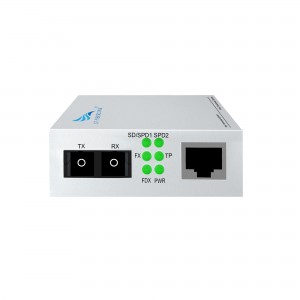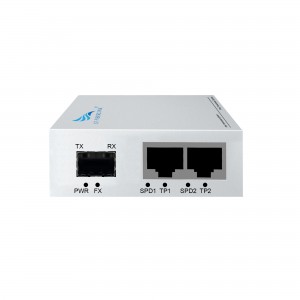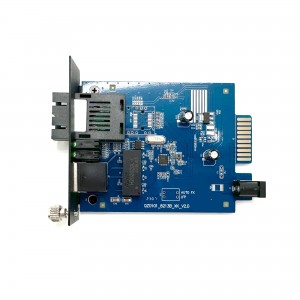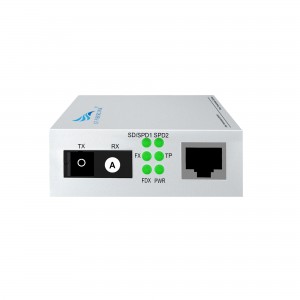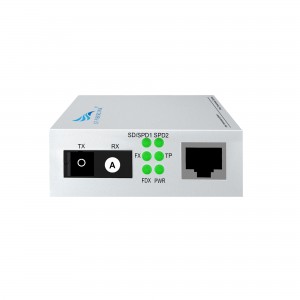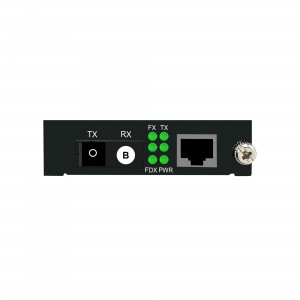8FE+2GE WDM Media Converter (Single-mode Single-fiber SC)
8FE+2GE WDM Media Converter (Single-mode Single-fiber SC)
Product Features:
Grandly launched Baiji 8-optical 2-electric single-mode single-fiber 20km A-end optical fiber transceiver, Huizhou Changfei Optoelectronics Technology Co., Ltd., as a company focusing on high-tech innovation, brings you revolutionary product communication equipment, we The latest products combine cutting-edge technology and outstanding performance.
Enter a world of seamless connectivity with our fiber optic media converters. This versatile device converts Ethernet signals to fiber optics, extending the reach and efficiency of network infrastructure. Whether you need Ethernet connectivity in the office, factory, or on the go, our portable fiber optic converters offer unmatched reliability and convenience.
100 Gigabit 8 Optical 2 Electrical Single Mode Single Fiber 20km Terminated Fiber Optic Media Converter is packed with powerful features designed to enhance your network experience. With iron shell design and IP30 protection level, durability and reliability are guaranteed even in harsh environments. The converter also supports an external power supply, providing flexible and convenient installation options.
Huizhou Changfei Optoelectronics Technology Co., Ltd. prides itself on constantly pushing the boundaries of technological advancement. Our commitment to innovation can be seen in this state-of-the-art fiber optic converter, which seamlessly bridges the gap between fiber optic and Ethernet connections. With our products, you no longer have to sacrifice network performance or convenience.
Get the advantage of faster and more reliable data transmission with the 100 Gigabit 8 Optical 2 Electrical Single Mode Single Fiber 20km A-Terminal Fiber Media Converter. The device enables high-speed data transfers up to 100 Gigabit, ensuring your network runs flawlessly even during peak usage. Whether you’re streaming HD video, transferring large files or running bandwidth-intensive applications, our fiber converters ensure a lag-free and uninterrupted experience.
Due to the single-mode single-fiber configuration, the fiber optic transceiver enables long-distance data transmission of up to 20 kilometers. This impressive series eliminates the need for additional equipment and simplifies your network setup. Say goodbye to the limitations of traditional Ethernet connections and embrace the possibilities offered by our fiber optic converters.
With excellent reputation and commitment to solidify the future of communication technology, Huizhou Changfei Optoelectronics Technology Co., Ltd. brings you Baiji 8 optical 2 electrical single-mode single-fiber 20km A-end optical fiber transceiver. Transform your network infrastructure with our cutting-edge solutions designed for the needs of the modern enterprise.
Stay connected no matter where you are with our portable fiber optic converters. Its compact design is easy to transport and install, making it ideal for mobile professionals. Whether you’re setting up a temporary office or need a reliable network connection at a remote location, our fiber optic converters give you the flexibility and convenience you need.
To sum up, the 100G 8-optical 2-electrical single-mode single-fiber 20km A-end optical fiber transceiver of Huizhou Changfei Optoelectronics Technology Co., Ltd. is a game changer in the field of network connection. With its excellent features, reliable performance and innovative design, this product ensures a seamless transition from Ethernet to fiber. Experience the power of high-speed data transmission and expand your network capabilities with our fiber optic converters. Trust our expertise and choose Huizhou Changfei Optoelectronics Technology Co., Ltd. for all your networking needs.
Technical Parameter:
| Model | CF-8F12GSW-20A | |
| Interface Characteristics | ||
| Fixed Port | 2* 10/ 100/ 1000Base-T RJ45 port
8* 155M uplink SC fiber port |
|
| Ethernet Port | 10/ 100/ 1000Base-T auto-sensing, full/half duplex MDI/MDI-X self-adaption | |
| Twisted Pair
Transmission |
10BASE-T: Cat3,4,5 UTP(≤100 meter)
100BASE-T: Cat5e or later UTP(≤100 meter) 1000BASE-T : Cat5e or later UTP(≤100 meter) |
|
| Optical Port | Default optical module is single-mode single-fiber 20km, SC port | |
| Wavelength/Distance | A-end: RX1310nm / RX1550nm 0 ~ 40KMB-end:RX1550nm/ RX1310nm 0 ~ 40KM | |
| A-end: RX1490nm / RX1550nm 0 ~ 120KMB-end:RX1550nm/ RX1490nm 0 ~ 120KM | ||
| Chip Parameter | ||
| Network Protocol | IEEE802.3 10BASE-T, IEEE802.3i 10Base-T,IEEE802.3u 100Base-TX, IEEE802.3u 100Base-FX, IEEE802.3x
IEEE802.3ab 1000Base-T;IEEE802.3z 1000Base-X; |
|
| Forwarding Mode | Store and Forward(Full Wire Speed) | |
| Switching Capacity | 5.6Gbps | |
| Buffer Memory | 4.16Mpps | |
| MAC | 2K | |
| LED Indicator | Fiber | FX1 (green)-FX8 (green) |
| On the RJ45 seat | 1X-2X Yellow:Indicate PoE | |
| 1X-2X Green: Indicates network working status | ||
| Power | PWR (green) | |
| Power | ||
| Working Voltage | AC:100-240V | |
| Power Consumption | Standby<3W, Full load<10W | |
| Power Supply | DC:5V/2A industrial power supply | |
| Lightning protection &Certification | ||
| Lightning protection | Lightning protection: 4KV 8/20us, Protection level: IP30 | |
| Certification | CCC;CE mark, commercial; CE/LVD EN60950;FCC Part 15 Class B; RoHS | |
| Physical Parameter | ||
| Operation TEMP | -20~+55°C;5%~90% RH Non condensing | |
| Storage TEMP | -40~+85°C;5%~95% RH Non condensing | |
| Dimension (L*W*H) | 220mm* 101mm*28mm | |
| Installation | Desktop | |
Product Size:
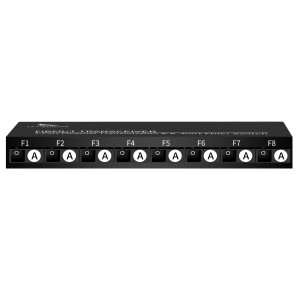
product application diagra:

How to choose a fiber optic transceiver?
Optical fiber transceivers break the 100-meter limitation of Ethernet cables in data transmission. Relying on high-performance switching chips and large-capacity caches, while truly achieving non-blocking transmission and switching performance, they also provide balanced traffic, isolation and conflict. Error detection and other functions ensure high security and stability during data transmission. Therefore, fiber optic transceiver products will still be an indispensable part of actual network construction for a long time. So, how should we choose fiber optic transceivers?
1. Port function test
Mainly test whether each port can work normally in the duplex state of 10Mbps, 100Mbps and half-duplex state. At the same time, it should be tested whether each port can automatically select the highest transmission speed and automatically match the transmission rate of other devices. This test can be included in other tests.
2. Compatibility test
It mainly tests the connection ability between the optical fiber transceiver and other devices compatible with Ethernet and Fast Ethernet (including network card, HUB, Switch, optical network card, and optical switch). The requirement must be able to support the connection of compatible products.
3. Cable connection characteristics
Test the fiber optic transceiver’s ability to support network cables. First, test the connection ability of Category 5 network cables with lengths of 100m and 10m, and test the connection ability of long Category 5 network cables (120m) of different brands. During the test, the optical port of the transceiver is required to have a connection capability of 10Mbps and a rate of 100Mbps, and the highest must be able to connect to a full-duplex 100Mbps without transmission errors. Category 3 twisted pair cables may not be tested. Subtests can be included in other tests.
4. Transmission characteristics (transmission loss rate of data packets of different lengths, transmission speed)
It mainly tests the packet loss rate when the optical fiber transceiver optical port transmits different data packets, and the connection speed under different connection rates. For the packet loss rate, you can use the test software provided by the network card to test the packet loss rate when the packet size is 64, 512, 1518, 128 (optional) and 1000 (optional) bytes under different connection rates. , the number of packet errors, the number of packets sent and received must be more than 2,000,000. Test transmission speed can use perform3, ping and other software.
5. The compatibility of the whole machine to the transmission network protocol
It mainly tests the compatibility of fiber optic transceivers to network protocols, which can be tested in Novell, Windows and other environments. The following low-level network protocols such as TCP/IP, IPX, NETBIOS, DHCP, etc. must be tested, and the protocols that need to be broadcast must be tested. Optical transceivers are required to support these protocols (VLAN, QOS, COS, etc.).
6. Indicator status test
Test whether the status of the indicator light is consistent with the description of the panel and the user manual, and whether it is consistent with the current status of the fiber optic transceiver.








